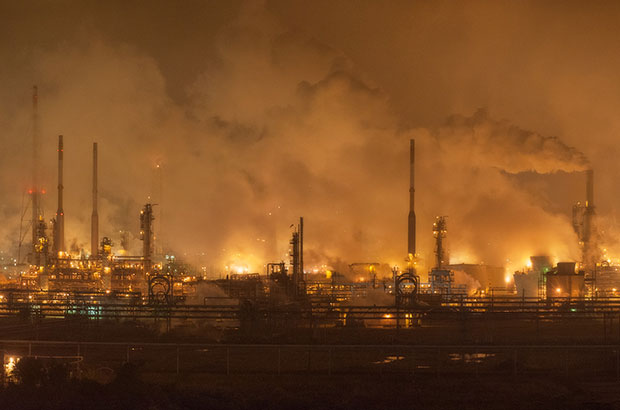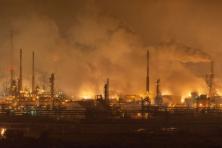Oil companies lie. They have a very long history of lying: they have lied about their predominant role in causing the climate crisis, they have lied about their plans to cut pollution, and, lately, they’ve been lying to you about the true cost of gas. As Washington’s transformational climate protection policies go into effect, the oil industry is doing all it can to delay this progress and distract from the benefits—cleaner air, more comfortable homes and buildings, access to cheaper transportation choices—these policies are bringing Washingtonians. We cannot fall for it. Instead, it’s time to hold the oil industry accountable.
The oil industry feigns concern about high prices in order to protect its massive profits
High gas prices have been in the headlines lately, and indeed, many drivers have felt the squeeze. This isn’t new: In May 2022, the Seattle Times reported on gas prices reaching $5.22 a gallon. As refining, retail, and other industry profit margins widened, driving up consumer prices, some federal policymakers expressed interest in price-gouging legislation. At the same time, oil industry supporters blamed “the Green New Deal.”
Oil companies have consistently spoken out of both sides of their mouths: while they feign concern for high prices at the pump, they use their high profits to further enrich executives and shareholders. While they claim to support climate action and a price on carbon in their PR materials, they spend millions and millions of dollars fighting and maligning climate action.
Just last week, a spokesperson for Chevron blamed high gas prices on Washington’s new climate policies. He said, “it’s not our job to go bankrupt to help the state avoid the consequences of its programs. There’s no way for a refiner to absorb those costs; they could literally bankrupt the industry.” Bankrupt? Chevron posted a $36.5 billion dollar profit last year—a record high.
High hypocrisy: the oil industry says climate is a concern but tries to block climate progress
While complaining about their supposedly looming bankruptcy, this Chevron spokesperson also said that “a price for carbon makes sense.” Indeed, the Western States Petroleum Association (WSPA), of which Chevron is a member, claimed to support “well-designed cap-and-trade” programs on a 2017 version of their website, and today, their website still states that “if a state is going to pursue climate policy” (emphasis added), they should pursue market-based approaches such as cap-and-trade. And yet, WSPA is spending millions of dollars undermining climate policy, including the Climate Commitment Act, in Washington alone.
This is a tried and true strategy for the oil industry: feign concern for the climate and for people, but then spend massive amounts of money to stymie access to cleaner, cheaper ways of getting around. A leaked 2014 presentation by WSPA showcased their plans to field fake “grassroots” campaigns in Washington, California, and Oregon that would spread the alarm about the supposed costs of climate policy. The presentation came complete with a photo of a climate justice march labeled “the worst of times.” In 2015, the Seattle Times reported on the oil industry’s opposition to Initiative 1631, a proposed fee on carbon pollution. The opposition campaign committee, set up by WSPA, raised over $25 million dollars; individual oil companies chipped in millions apiece.
And they’re still at it. Today, WSPA is running a front group called Affordable Fuel Washington that is running large ads, telling Washingtonians that current gas prices are the fault of climate policy. WSPA has transferred over $2.5 million to the front group since December 2019, with over a million of that amount coming this year alone. Those costs are on top of their regular lobbying expenses. Ironically, these ads complaining about high gas prices are being funded by… high gas prices.
The oil industry is costing us… and killing us
Oil companies have never truly been held accountable for misleading us, let alone for the harms they have caused. Over 100 people died due to the 2021 heat dome in Washington. As this occurred, ExxonMobil announced $4.7 billion in profits for the second quarter of that year. Marathon? $8.5 billion. Chevron? $3.1 billion. You get the picture. Washington’s Department of Labor & Industries says we could lose up to $153 million annually from extreme heat, fueled by the oil industry. And sadly, the mercury is rising. We just saw the hottest week on record globally.
“Smoke season” is now a thing. How many of us have had to buy box fans and air filters? How many of us have had to choose between sweltering indoors or exposing ourselves to smoky air outside? How many of us have been forced into buying inefficient window air conditioners? How many of us have, or know people with, asthma who are having to get inhaler refills or skip work to take care of ourselves or our sick kids?
Holding the oil industry accountable will provide needed relief
Washington finally has climate protection laws that are holding the oil industry accountable: they now must cover some of the costs of their pollution that we have borne for decades through poor air quality, heat waves, smoke, floods, and more. What they pay is being turned around to get heat pumps to heat and cool Washingtonian’s homes and apartments, keeping out smoke and providing comfortable temperatures while reducing utility bills. What they pay is funding public EV charging infrastructure. What they pay is taking big, diesel trucks off the road and replacing them with clean, electric ones so that we can breathe clean air. What they pay is funding transit options.
The oil industry wants to prevent us from seeing and appreciating these benefits. Our state’s climate policies support all these things, but the oil industry is trying to stoke opposition to our new laws by blaming them for higher fuel prices—and using money we pay at the pump to fund related lobbying and PR efforts!
What can we do? We have to hold the oil industry accountable for their lies and for preventing progress. California just passed legislation to provide transparency on profits and prevent price gouging, and so should Washington. The Washington legislature can follow suit by passing legislation that would require the oil industry to be more transparent about their costs and profits from refining to the pump, and penalizing them for price gouging. We also must protect our climate legislation. The oil industry wants to block it, to deny us cleaner and cheaper alternatives. Instead, the legislature must continue to thoughtfully invest the funds generated from polluters in helping Washingtonians get relief from climate impacts such as heat and smoke—and from being locked into paying high prices at the pump.





